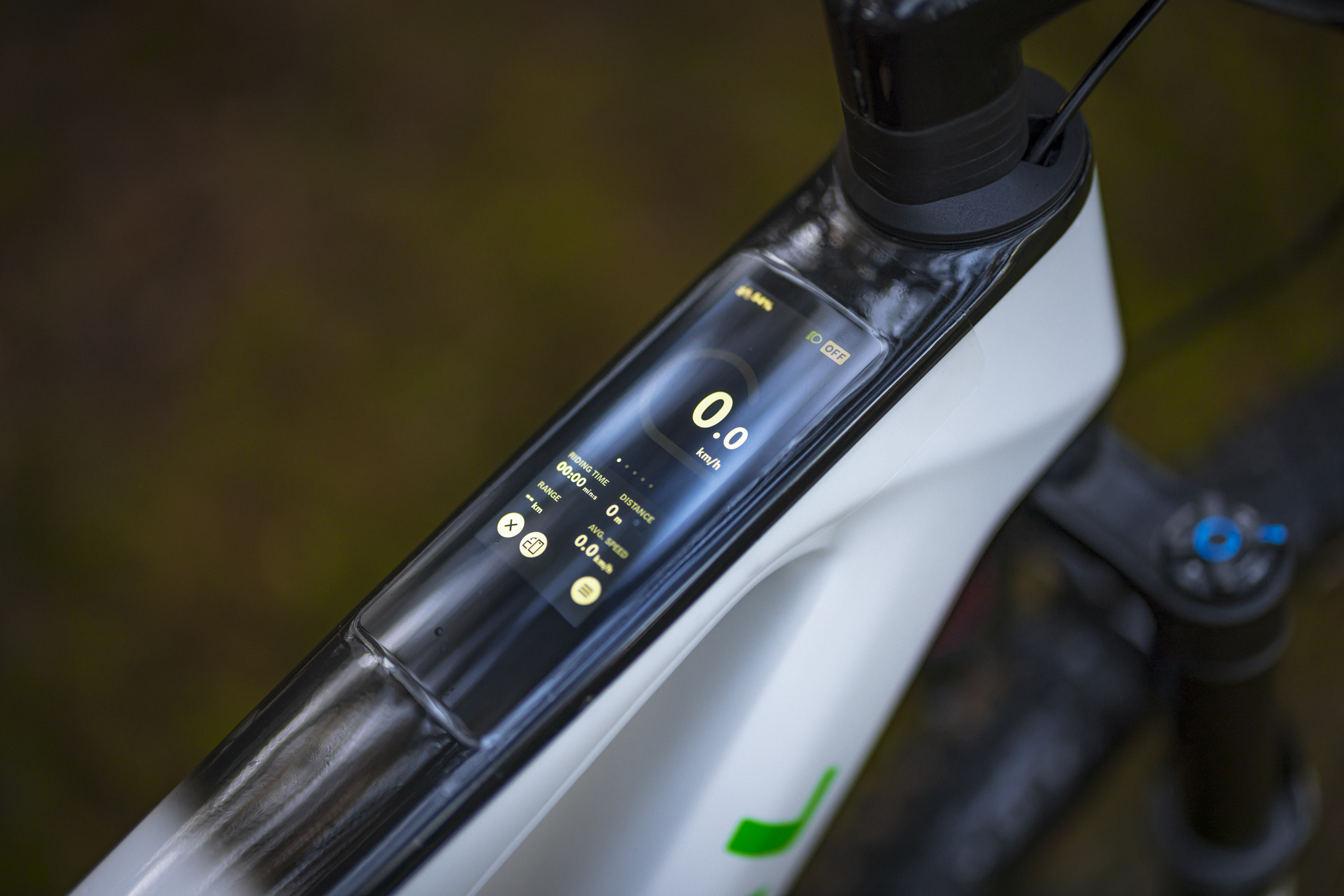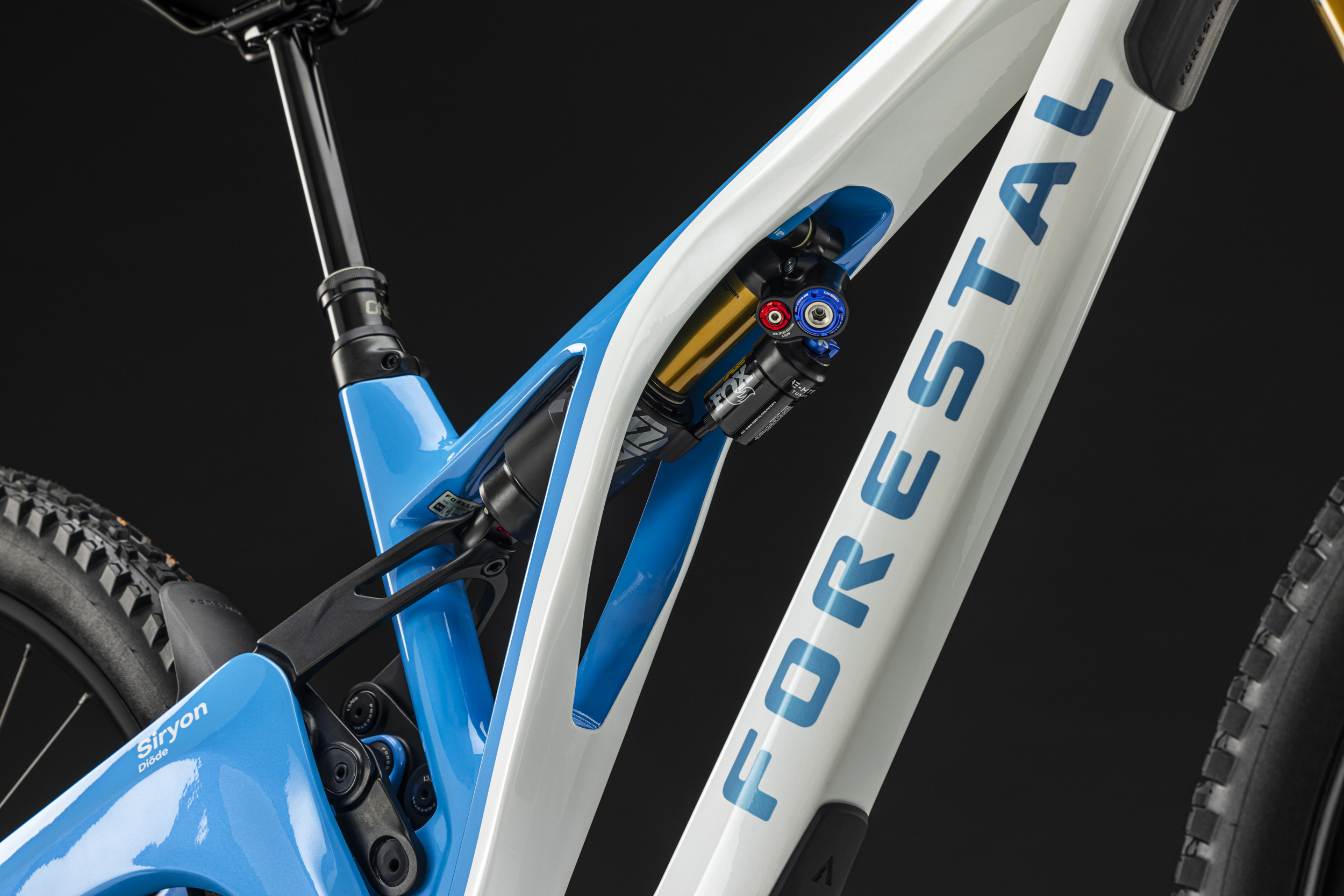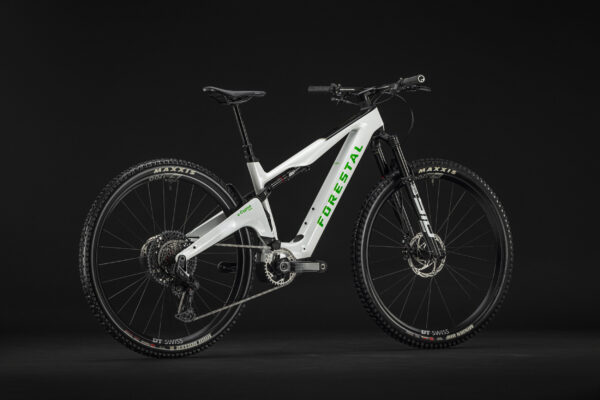After 18 months in the doldrums, Andorra-based Forestal is back with a fresh range of bikes, including a new e-bike powered by a Bosch motor, and hoping to put its woes behind it.
Forestal had us hooked when it showcased its Cyon and Siryon e-bikes in 2020. The slick frames, low weight, and hi-tech integrated displays were pioneering at the time, but production delays, poor range, and the non-delivery of the promised range extender left the brand floundering while competitors caught up.
I’m pleased to report that Forestal seems to have put those issues behind it with the announcement of a new of e-bike powered by the Bosch SX system, as well as two new analogue models, called the Cygnus and Siryon.

The new XC-orientated e-Cygnus uses a Bosch SX motor, but the top tube controller is upended in favour of a slick new colour dashboard.
Forestal 2025 range need to know
- 2 new muscle-powered models – Siryon (enduro), and Cygnus (XC/down-country)
- 1 completely new assisted model, the Cygnus XC/down-country bike
- Bafang motor ditched in favour of the Bosch SX system with 400Wh batteries and range extender compatibility (250Wh)
- Forestal’s own Smart Dashboard 2.0 is an integrated top tube touchscreen display with built-in GPS and features on the e-Cygnus
- Two build kits on each bike, as well as frame-only options
To put a bit of skin on those bones, let’s start with the two completely new models – the Cygnus and e-Cygnus.

The analogue Cygnus is a short-travel ripper aimed at XC racing and down-country shredding.
Forestal Cygnus
While previously known as a pure e-bike brand, Forestal obviously has intentions to develop a stable of conventional bikes as well. The first of these is the Cygnus, an XC/down-country model with 120mm of travel. And rather than try to find the perfect compromise between the competitive edge, and high-speed thrills purely for fun, Forestal has developed two different versions: the pure race-focussed Diode, and the more down-country optimised Halo. The former gets a RockShox SID spec with 120mm fork and SID Luxe shock, as well as fast-rolling Schwalbe tyres. While the down-country build adds a further 10mm of travel up front with a Fox 34 Performance Elite fork and Fox Float Performance Elite shock.

Integrated frame storage is one of the features on the new Forestal Cygnus.
Other subtle differences include a one-piece integrated bar and stem on the Diode, and a 45mm stem and 780mm bar on the Halo. Both get Forestal’s Twin-Levity (twin-link) suspension system with a sturdy carbon swingarm that partially hides the links, and a top tube that wraps around the forward shock mount.
Three sizes are available, S/M, L, and XL, with respective reach numbers of 445mm, 470mm, and 495mm. Head angles are 67º across the board, chainstays are short at 435mm, and the BB is relatively high (given the travel) at 334mm.
Halo builds are €6,999, while the Diode model costs €8,999. A frame kit is available at €3,999.

With a Bosch motor, the Forestal e-Cygnus takes aim at bikes like the Scott Lumen.
Forestal e-Cygnus
The second completely new model in the range is the e-Cygnus. As the name suggests it’s an assisted version of the Cygnus, with the Bosch SX motor tapping out up to 600W peak power and 55Nm of torque. Supplying the energy is the 400Wh internal battery, which can be supplemented by Bosch’s 250Wh PowerMore range extender. It’s a move that will cure Forestal’s range issues – when we tested the Cyon trail bike, we only got 691m of elevation out of the Bafang motor and 360Wh internal battery, far less than the Fazua, TQ, and Specialized systems – although aspects of the SX motor will not be to everyone’s taste. Namely the high-revs needed to get full power, and the rattle when coasting.

Almost a carbon copy of the analogue Cygnus, the assisted version also gets 120mm of travel paired with a 120mm or 130mm fork. As such, it’s going up against the likes of the Scott Lumen and Rotwild R.X275 as a fast-paced down-country scalp-hunter.
Front and centre in the top tube is the Smart Dashboard display with colour touchscreen data and mapping thanks to the built-in GPS. Forestal compares it to the likes of Apple CarPlay, where the waterproof, glove-friendly display works with third party apps to increase the enjoyment and enhance the experience.
As with the conventional bike, choose the Diode and you get the RockShox SID spec with less travel up front, while the Halo spec is more trail-orientated with a 130mm travel Fox fork.
Geometry is mostly identical to the conventional Cygnus, with the main exception of the chainstay length, which is 13mm longer at 448mm.
Prices are very much in the premium territory, with the Halo model costing €9,499 and the Diode €11,299.

The Forestal Siryon gets 170mm travel and some welcome tweaks to the geo and sizing.
Forestal Siryon
We tested the Forestal Siryon back in 2022, and while we liked the suspension performance and handling on rowdy terrain, we were less impressed with the lack of range. Well, getting rid of the motor and battery is certainly one way of curing that range anxiety. Yes, the new Siryon is not an e-bike at all, even though it uses a very similar frame layout and Twin-Levity suspension design to the assisted model.
It’s a full-29er with 170mm travel, and updated geometry with a steeper seat angle for better climbing. Chainstays are also shorter than the e-bike version at 435mm, while the seat tube lengths have been dramatically reduced for better manoeuvrability.

The Diode model costs €8,999 and the Halo costs €6,999.
What next for Forestal?
With sparks of life at Forestal, the obvious question is, what will happen to the brand’s existing e-bikes – the Siryon and Cyon? Will they persevere with the Bafang motors, finally launching the promised range extenders and mode customisation? Or has that ship sailed, and will Forestal jump ship for another motor supplier? Personally, I think the latter is the better option, particularly for a small brand where developing software and electronics is a big investment. When off-the-shelf drive units are so good now, there’s limited return in going solo, alongside significant risk.




